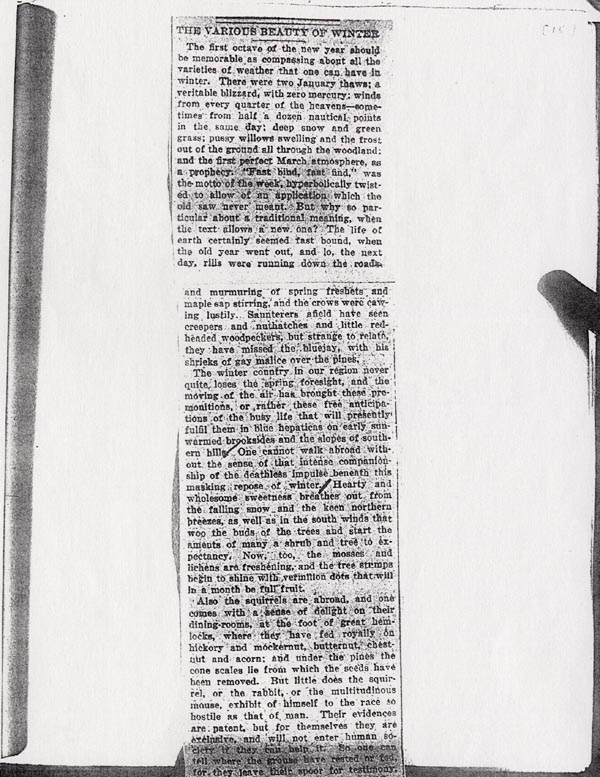
THE VARIOUS BEAUTY OF WINTER
The first octave of the new year should
be memorable as compassing about all the
varieties of weather that one can have in
winter. There were two January thaws; a
veritable blizzard, with zero mercury; winds
from every quarter of the heavens -- some-
times from half a dozen nautical points
in the same day; deep snow and green
grass; pussy willows swelling and the frost
out of the ground all through the woodland;
and the first perfect March atmosphere, as
a prophecy. "Fast bind, fast find," was
the motto of the week, hyperbolically twist-
ed to allow of an application which the
old saw never meant. But why so par-
ticular about a traditional meaning, when
the text allows a new one? The life of
earth certainly seemed fast bound, when
the old year went out, and lo, the next
day, rills were running down teh road
and murmuring of spring freshets and
maple sap stirring, and the crows were caw-
ing lustily. Saunterers afield have seen
creepers and nuthatches and little red-
headed woodpeckers, but strange to relate,
they have missed the bluejay, with his
shrieks of gay malice over the pines.
The winter country in our region never
quite loses the spring foresight, and the
moving of the air has brought these pre-
monitions, or rather these free anticipa-
tions of the busy life that will presently
fulfil them in blue hepatiens on early sun-
warmed brooksides and the slopes of south-
ern hills. [/] One cannot walk abroad with-
out the sense of that intense companion-
ship of the deathless impulse beneath this
masking repose of winter. [/] Hearty and
wholesome sweetness breathes out from
the falling snow and the keen northern
breezes, as well as in the south winds that
woo the buds of the trees and start the
aments? of many a shrub and tree to ex-
pectancy. Now, too, the mosses and
lichens are freshening, and the tree stumps
begin to shine with vermillion dots that will
in a month be full fruit.
Also the squirrels are abroad, and one
comes with a sense of delight on their
dining-rooms, at the foot of great hem-
locks, where they have fed royally on
hickory and mockernut, butternut, chest-
nut and acorn; and under the pines the
cone scales lie from which the seeds have
been removed. But little does the squir-
rel, or the rabbit, or the multitudinous
mouse, exhibit of himself to the race so
hostile as that of man. Their evidences
are patent, but for themselves they are
exclusive, and will not enter human so-
ciety if they can help it. So one can
tell where the grouse have rested or fed,
for they leave their spoor for testimony.
---------------------------------------------------------



